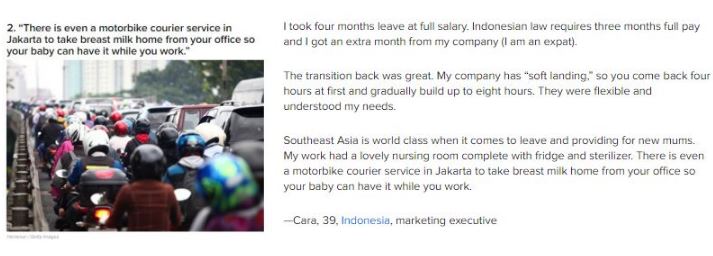A recent Buzzfeed article aimed to explore the realities of parental leave (both maternal and paternal) in countries around the world. It included one example from Indonesia – an expatriate mother in Jakarta who said that Indonesia has some of the best support systems for new mothers in Southeast Asia, including maternity leave, in-office breastfeeding rooms, and even breast milk transport services such as online ojeks.

Screenshots: Buzzfeed
Most of the people in other countries reading the article must have thought Indonesia sounds like a paradise for working mothers.
But the reactions to the article I saw on social media here in Indonesia were generally filled with anger and horror that Buzzfeed would use her experience as a representative example of what things were actually like for working mothers here.
While it is great that Cara had a positive experience, most working mothers’ in Indonesia aren’t so lucky – even in my own office, where a number of women (including expats) have been pregnant while working, there are no facilities to support them beyond the 3 months of government-mandated maternity leave (and certainly no nursing room!).
The more women I talked to about the issue, the clearer it became that Indonesian workplaces often force them into a position of having to choose between their roles as mothers and maintaining their careers.
And that’s not just holding women back – it’s holding the country back.
Labor Burdens
Since the 1980s, the number of Indonesian women in the workforce has grown dramatically, yet women remain under-represented overall. According to the Asian Development Bank, for every 10 men employed, there are only six women, even though the national birth rate has fallen and theoretically would allow more women to enter the workforce. Women are also less likely to work in leadership and management positions, and women who drop out of formal work to have children often do not return. Those who do resume working tend to focus on self-employment, even as their children grow older.
Michele Ford, an academic at the University of Sydney, points out that it is “widely accepted” that women in Indonesia will “continue to take the responsibility for managing the home”. She writes with Nurchayati in Women, Work and Care in the Asia-Pacific that “Indonesia has almost no government-funded care infrastructure and provides no social security benefits for carers,” and that there is almost no debate about the topic, probably due to the fact that most middle- and upper-class women can afford to employ domestic workers or nannies to look after children and assist around the house.
But with rising salaries and better economic opportunities abroad, full-time nannies are increasingly out of reach for many Indonesian families. And without other options such as state-subsidized daycare, many expectant mothers are forced to make tough decisions about their careers.
“Even though I was working from home, it was really, really exhausting, because the baby still woke up every 2-3 hours to breastfeed so I was really deprived of sleep.”
Renny, a first-time mother in her mid-30s, had no maternity leave when she gave birth to her son in 2015. Her work contract was project-based, and the project finished one month before her due date.
“I tried to negotiate with them,” Renny explained, but she was not successful, losing both her office-funded health insurance and maternity leave (unlike many countries, maternity leave in Indonesia is funded by workplaces, not the government), despite the fact Renny had continued to work up until she was more than eight months pregnant. Her husband was only able to take two weeks off work, as they were worried about the financial impact that a longer period of leave would have on their now one-income family.
Once her child was one year old, Renny returned to her office, relying on a nanny to look after her child while she is out of the house. “But there is no breastfeeding room at my office,” she added, which has made long-term breastfeeding difficult.
Hera, also in her 30s, worked as a web editor at a media company when she decided to have a baby last year. As with Renny, Hera was employed on a contract, but as she was paid an hourly rate and had no additional benefits like health insurance or leave.
“I chose the job because it was quite flexible,” Hera said. “I can work from home and take days off anytime. But days off means no payment.”
When she had her baby, Hera “took three months’ maternity leave without income. [We had] some income from my husband and some that I had saved up. My husband didn’t get any paternity leave from his office, so he took a week from his annual leave.”
After three months, Hera felt forced to go back to work, “because I had run out of money. Even though I was working from home, it was really, really exhausting, because the baby still woke up every 2-3 hours to breastfeed so I was really deprived of sleep.”
“… women felt that they could not be both a good mother and a responsible employee, as they ‘can’t leave the baby too long when traffic is crazy, as work ends up being from 5:30am to 8pm if you live on the outskirts of Jabodetabek.'”
3 Months Leave is 3 Months Short
So is three months of maternity leave enough for a new mother? Hera doesn’t think so. “Three months is not enough,” she said. “At least six months would do because babies start to eat solid food and their sleeping habits start to be predictable. In short, nine months of pregnancy then labor is nothing compared to the first six to nine months after birth.”
Yeni, who had her fourth child in 2016, agrees. “My husband sells products online from home, so he was able to be with me during my pregnancy, childbirth, and afterward,” she said. “But for me, I don’t think three months was enough. I took the three months official maternity leave then two more months unpaid leave so that I could go home [to Padang for the birth].” She thinks that six months maternity leave would be adequate, “until at least the first six months of exclusive breastfeeding is complete.”
Research backs up Renny’s, Hera’s, and Yeni’s experiences. Dr Ariane Utomo, a demographer at The Australian National University, conducted research in Jakarta in 2016 on how workplaces treat pregnant women and new mothers. Dr Utomo and her research partners found that support was lacking, and that many mothers decided not to return to the office – some because of discrimination, but more because of a lack of flexible working hours.
Other women were not permitted to continue working after marriage, as they had met their husbands at their workplaces and their bosses did not allow married couples to work together.
“Our findings pointed to constrained choices,” Dr. Utomo told me. Firstly, maternity leave provisions were inadequate, and even after having their child, women felt that they could not be both a good mother and a responsible employee, as they “can’t leave the baby too long when traffic is crazy, as work ends up being from 5.30am to 8pm if you live on the outskirts of Jabodetabek.”
Other women were not permitted to continue working after marriage, as they had met their husbands at their workplaces and their bosses did not allow married couples to work together. So not only did this deny them access to maternity leave, it also led to major repercussions for the women after they ended up getting divorced from their husbands.
“The women were left with years of having no work experience, and they cannot return to their previous professions following separation,” Dr. Utomo explained. “One woman had worked at a TV station as a costume designer, while another was a factory worker.” Neither could get their old jobs back.

One crucially important element is family support. Dr. Utomo’s research highlights that having a supportive family member, such as a parent, parent-in-law, or grandparent, enables women to return to work more easily. Thanks to Indonesia’s tightly-knit families and communal culture, many new mothers can indeed rely on that sort of support to maintain their careers, but it also creates a situation where the government doesn’t feel pressured to force businesses to support the careers of new mothers.
So it’s easy to understand why a lack of family support, combined with minimal maternity leave, non-family-friendly working conditions and gender-based discrimination from employers, could lead many Indonesian women to simply not re-enter the workforce after having children, even after their children begin attending school.
Asian Development Bank research indicates that as much as 25% of Indonesian women out of the labor force would like to take a job if they could find an appropriate position, indicating that mother-friendly workplaces remain uncommon.
Further complicating the situation is the 1974 Marriage Law, which explicitly states that a married woman is responsible for looking after the household, rather than working outside the home, which is seen as a man’s job; this viewpoint is commonly held by male employers across the country.
More recent government efforts to address the issue have been met with mixed results. Vice President Jusuf Kalla suggested in 2014 that working hours for female public servants with young children could be reduced from eight hours per day to six hours, although this idea was strongly rejected by many feminists, who rightly questioned why only female civil servants were considered responsible for looking after their children and not their male counterparts.
“There is no material benefit yet for my office [in giving maternity leave],” Kokok admitted. “But it is enough for me to see that my female employees are happy.”
There are some positive developments amongst small businesses, with many beginning to recognize the benefits of paid maternity leave, both financial and personal. Kokok Dirgantoro, CEO of Opal Communication, says his office provides female employees with six months of maternity leave.
“I decided to offer employees maternity leave because of my experience when my wife was pregnant with our first child,” Kokok said. “I saw that three months leave was not enough and that the minimum should really be six months. 10 years later, I now have my own business, so I decided to put it into practice.”
Although Kokok acknowledges that his workplace is fairly small, employing just 20 people, two women are already on maternity leave. “There is no material benefit yet for my office [in giving maternity leave],” Kokok admitted. “But it is enough for me to see that my female employees are happy.”
Many economists would assure Kokok that he will eventually see economics benefits to the policy as well, such as lower employee turnover, lower absenteeism, and better office morale. It’s not just the right thing to do – working mothers who feel supported and respected are going to work harder, be more productive and go the extra mile for a company that goes the extra mile for them. That’s definitely something all those political and business leaders in Indonesia, who are constantly worrying about how they can improve the country’s economy, should consider as well.
Kate Walton is a Jakarta-based writer, photographer, and activist. She is the founder of Jakarta Feminist Discussion Group, one of the organizers of Women’s March Jakarta and the researcher behind Menghitung Pembunuhan Perempuan.





Reader Interactions